Contents
Artificial irrigation is one of the main ways to increase the yield of the garden and vegetable garden. If there is a source of water on the site or a large container is installed for collecting and storing it, then an irrigation system can be organized. To do this, you will definitely need a hose, or even more than one. How to choose it correctly so that it is convenient to water, spend a little money, and it would be possible to operate it for years?
Reinforced or not: which one to choose
Hoses are available in nylon, plastic, rubber, single-ply and multi-ply. To decide which instance to choose for an irrigation system, you need to look at your site.
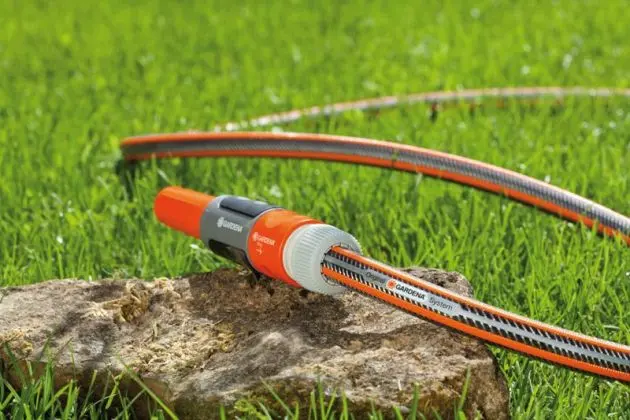
If the garden plot is not small, the water source is far away, then you will have to supply water over a long distance, in which case, most likely, a pump will be used. The pressure of the water flowing out of the barrel and the water supplied by the motor is very different: in the first case, any single-layer hose will fit, and in the second, you will need a strong one that can withstand a pressure of at least 6 bar. Ordinary garden single-layer, used for watering trees, can withstand 3-4 bars. When water is supplied through such a conductor with high pressure, it wears out too quickly.
Traditionally, a rubber hose is associated with a garden or cottage. It has many qualities due to which it is chosen: strong enough, elastic, resistant to low temperatures and ultraviolet. But it is heavy and difficult to move from tree to tree or from garden to lawn around the site while watering. In addition, the composition of rubber is different, most often hoses made of toxic rubber are bought for watering the garden, plants are not harmed, but when planning to use it for drinking water, you need to choose a product with a sanitary conclusion about its harmlessness. This can be important as water is often supplied to outbuildings for animals and people. When choosing a rubber sample, remember that the wall thickness should be 4-6 mm, not less, and the softer the rubber, the longer it will serve you.
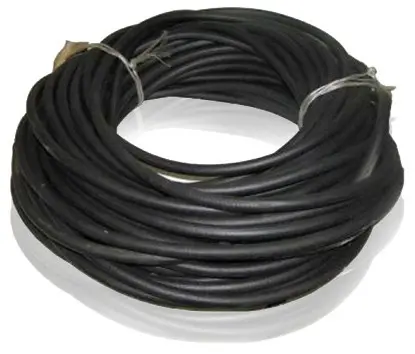
PVC hoses are not as durable as rubber hoses, but they also have their advantages. Single-layer ones are cheap, but may not last until the end of the season: they curl, break, burn out under the influence of the sun. Only a multilayer reinforced hose should be chosen for the irrigation system, and the reinforcement is better woven mesh, and not cruciform. This option is more durable, it does not break, it is able to withstand heavy loads and high air temperatures. The outer braid is more durable if made of nylon rather than vegetable material. The rubber version will still be used longer due to immunity to ultraviolet radiation.
If it is intended to use any installations that increase pressure, it is better to take a three-layer hose, with an internal reinforcing layer and an external protection made of polyvinyl chloride. For irrigation of large areas (stadiums, golf courses), four- and five-layer analogues of increased strength are used, but it is not advisable to choose them for irrigation systems of a garden or garden trees.
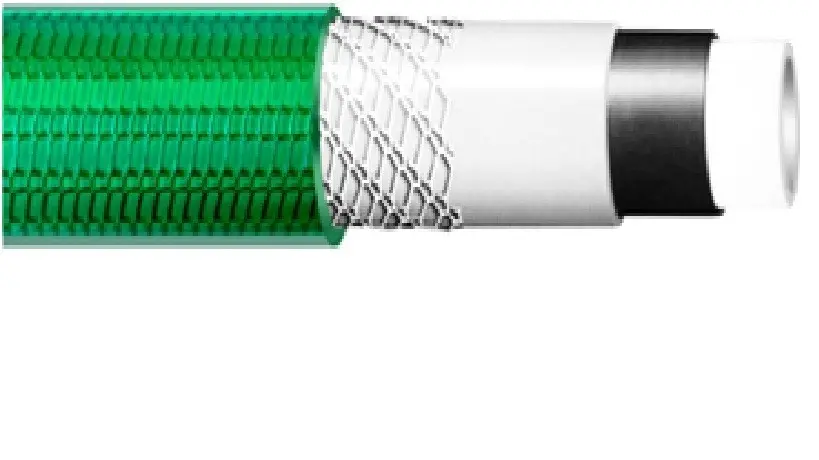
Reinforced hose would be the best option for garden irrigation systems. It practically does not require maintenance, is resistant to mechanical damage, and can be used intensively for up to 10 years. If an intake hose is required (for taking water from a well), then only reinforced is used here. The only drawback is the weight, but for such cases there are reels on wheels to make it easier to handle it in the garden and in the garden.
Garden Watering: Hoses and Quick Couplings View
The video shows a wide variety of hoses and quick couplings for every taste.
Hose diameter and length
It is easy to determine the length, you need to find out the distance from the water source (faucet, well) to the farthest tree or bush that needs watering. The number is rounded up to the nearest ten – that’s all arithmetic.
The choice of diameter depends on the overall length of the hose and the expected water pressure. If you take a very small diameter, then the jet will turn out narrow, which means that water will be supplied for a longer amount of time. If the diameter is too large and the water pressure system is weak, then this watering will not speed up. Usually, when buying, you have to choose between the values: 13, 15 25 mm.
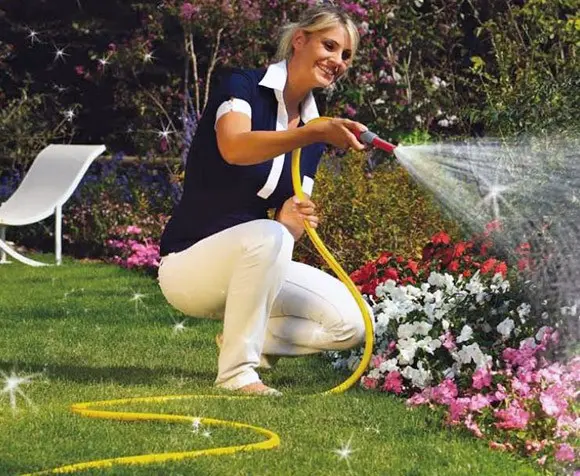
You need to know exactly what pressure your pump is designed for, find out when buying the number of layers in the hose. Each layer adds strength to withstand the extra 4 bars, it’s so easy to calculate which one is needed. Multi-layer reinforced hoses can withstand pressures up to 40 bar, but this is hardly necessary in the garden for watering trees, so it is better not to overpay extra money for an exorbitantly powerful product.
Choose by destination
What might hoses be used for in the garden? With their help, water can be taken from a well or a well, water can be supplied to a house or outbuildings, manual or automatic watering of garden trees and garden crops can be carried out.
For water intake, we definitely choose a reinforced hose with a safe inner coating (we are interested in a sanitary conclusion). For the supply of drinking water, we strictly select a harmless hose. For irrigation systems, this is not so important, here you need to pay attention to what temperature it can withstand and what pressure.
There are hoses (Sardinia, Winner, Tricolux), which are coated inside with a special composition created on the basis of today’s biotechnology, which ensures environmental friendliness and harmlessness to humans. Double-reinforced structure for high pressure performance. Such hoses can be used for any household needs – to supply water to a residential building (both cold and hot) or to water trees and flowers.
Presto-PS from Italy offers a special tape hose for drip irrigation. Its microporous surface slowly passes water along its entire length, it is buried to the desired depth near the roots of vegetable crops. It provides economical, but sufficient watering directly to the root system of plants. And there are hoses, along the entire length of which there are 3 rows of small holes, they are placed at a certain height for drip irrigation of plants. Products of this type are very convenient to use in automatic irrigation systems.
Separately, I would like to focus on transparent hoses, there are good reviews about them, but such an instance without a special reflective layer can bloom from the inside. Under the influence of solar heat and light, algae multiply inside, which is very difficult (almost impossible) to get rid of. After using the hose, there is always a little moisture left inside it, it is she who begins to emit an unpleasant odor, bacteria are bred in it under the influence of the sun. It is better to opt for opaque options.
How to store
The lifespan of manual and automatic irrigation systems often depends on how the hoses are stored. It is best to store the hose in its original packaging. If a special drum is not provided for storing it, you can do it yourself, wind a hose around it after use, this will eliminate the possibility of kinks, creases, mechanical damage, and save space.
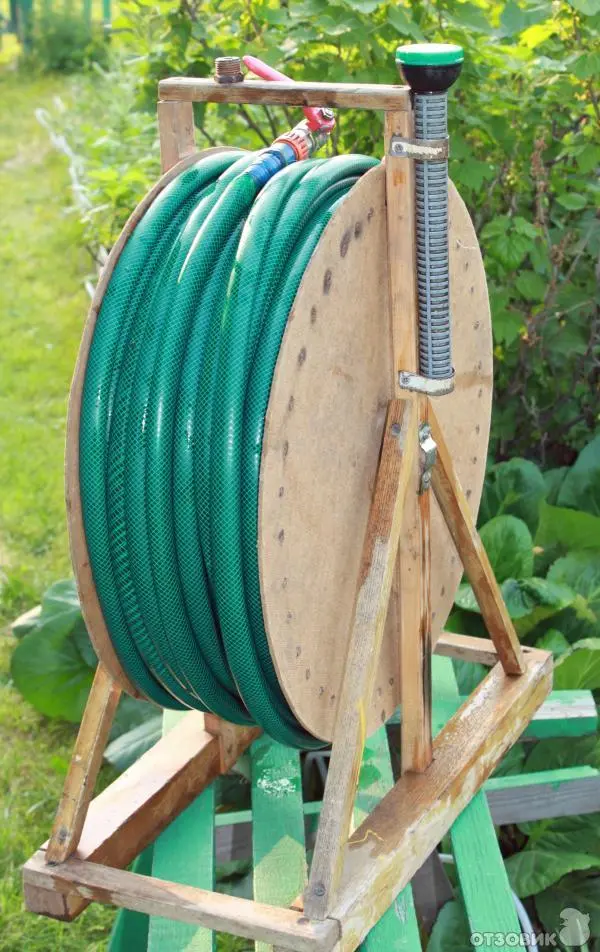
It is better to store watering equipment in a dry place at a positive temperature, preferably away from rodents and direct sunlight.
When using a hose, you need to carefully monitor the change in water pressure so that it does not exceed the permissible limits. Try not to put heavy or sharp objects on the hose to avoid mechanical damage, keep it clean, do not leave it under a tree after use.
Video “Garden hose storage”
The video describes a device for winding and storing a garden hose.









